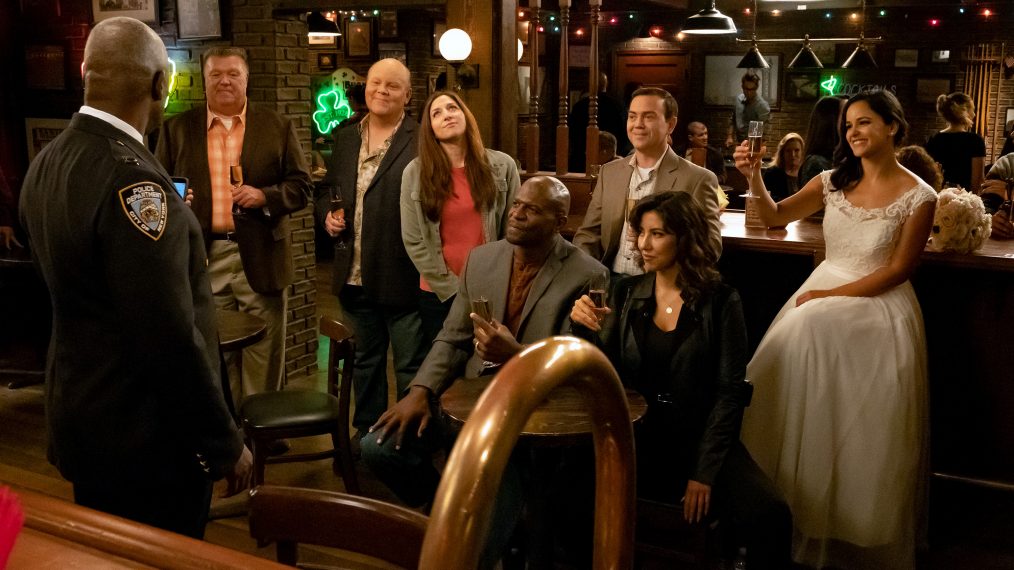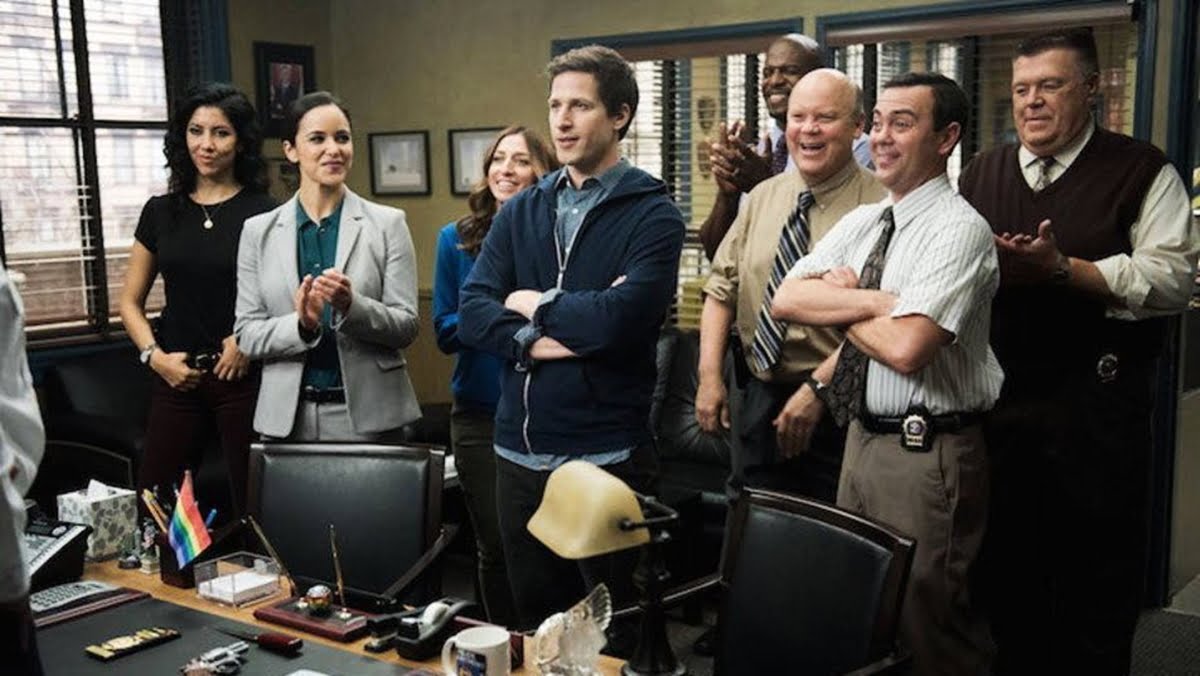Posted by Priyanka Joshi
Brooklyn Nine-Nine (B99), inarguably one of the most popular American sitcoms, is all set to grace the small screen for its final season this year. Another Michael Schur creation, the series is a cop-comedy revolving around the detectives of the 99th Precinct of the New York Police Department (NYPD). Over the course of its broadcast, the show has garnered appreciation from critics and audiences alike, with fans rallying for the show to be picked up when it was dropped by Fox Network during season 5.
Several reasons have been proposed for the show’s popularity, especially it’s representation of LGBTQIA+ and POC characters, handling of the MeToo movement and by extension, the inclusion of these narratives.
However, the show landed in hot waters after George Floyd’s death in 2020. Floyd, an African American man was murdered by Derek Chauvin, a police officer, on suspicion of theft. Naturally, the incident sparked massive outrage against police brutality, with chants of defunding the police and ACAB (All Cops Are B*st*rds) being featured heavily.
The comforting, familial setting of the show contrasted starkly with the systemic violence and racism perpetrated by the police force. A question had to be asked: where did Brooklyn Nine-Nine fit within this larger narrative? Could it be dismissed as a mere utopian portrayal, or was it a propaganda piece with real-life consequences?
The B99 fandom landed in a state of cognitive dissonance within this scenario. The comforting, familial setting of the show contrasted starkly with the systemic violence and racism perpetrated by the police force. A question had to be asked: where did Brooklyn Nine-Nine fit within this larger narrative? Could it be dismissed as a mere utopian portrayal, or was it a propaganda piece with real-life consequences?

When B99 was initially released in 2013, the most appreciated feature was the diverse casting of the show – actors of colour outnumbered white ones. Moreover, this representation wasn’t merely tokenistic; each individual had a strong character arc that skilfully rejected and subverted racial stereotypes. Both Terry Crews and Raymond Holt’s characters steered away from the ‘angry black man’ stereotype.
Crews is portrayed as a strong yet nurturing figure, whereas Holt is a methodical, stoic persona. However, despite this representation, the show failed to provide a nuanced view of the obstacles that people of colour face. For instance, in the episode in Brooklyn Nine-Nine where Terry was stopped and frisked by a white cop, most of the storyline focused on Holt dissuading Terry from filing a complaint. There was no follow up on the case, no information about the punishment (or lack thereof) for the cop. The implication was clear – this incident was an exception in a system of anti-racist, well-trained officers; a case of “a few bad apples.”
Also read: Detectives Of The 99th Precinct: A Feminist Reading Of Masculinities In Brooklyn 99
To add to this, Brooklyn Nine-Nine constantly portrayed current issues as matters of the past. Homophobia within the force, for example, is only addressed in terms of Holt’s past experience as an openly gay cop in the 80’s. Sample this dialogue by Holt – “He was a great partner. Smart, loyal, homophobic, but not racist. In those days that was pretty good.” By doing so, the show invisibilises the historical violence perpetrated by the police against queer individuals and spaces. To cite recent examples, during the 2020 protests against police brutality, queer medic spaces were specifically targeted by the force. Additionally, on the 51st Anniversary of the Stonewall uprising queer protestors were batoned and pepper-sprayed by the NYPD. Queer individuals also continue to be one of the most incarcerated populations.
/cdn.vox-cdn.com/uploads/chorus_image/image/54930349/b99_holt.0.png)
However, the most crucial disadvantage of the series is that it is narrated from the perspective of a cop. Such a narrative undoubtedly paints police officers as “good guys” with the exception of bad cops who are painted as anomalies within the system. Therefore, cops are not represented as stone-pelters, tear-gas hurlers, domestic violence inflictors – all of which, in real, they’ve been charged for numerous times in the past.
The most crucial disadvantage of the series is that it is narrated from the perspective of a cop. Such a narrative undoubtedly paints police officers as “good guys” with the exception of bad cops who are painted as anomalies within the system.
Another by-product of such a narrative is that incidences of unprofessional behaviour are passed off as character “quirks”. Take Jake Peralta for instance, a cis-het white male cop who arrested Kid Cudi’s character on account of jewellery theft without any evidence. The rationale behind the arrest? Peralta had a “hunch”.
Also read: Why Brooklyn Nine-Nine’s #MeToo Episode Was Perfect In Its Portrayal
Furthermore, as the storyline proceeds, Peralta’s hunch is proven correct, and by extension he is absolved of his unprofessional behaviour.

Similarly, when a Macedonian witness appears in the precinct to report convict escape, she is laughed off as a “bum-tum” because the officers cannot understand the language she is speaking. This, despite the fact that in crime situations, minority individuals fall victim to the bystander effects due to fear of being mistreated by State authorities.
Another fallacy of this epic point of view is the defamation of individuals and institutions that counter police violence and racism. The most prominent example of such vilification is seen through the character of Sophia, a defense attorney whom Peralta briefly dates. Throughout her appearance, Sophia is criticised by the police officers, even being referred to as a “subhuman piece of human garbage”.

Here by slandering the profession, the show reinstates cops as the epitome of honour, truth and courage; a noble profession devoid of flaws. This sacrosanct view of the force is reinforced by introducing storylines that privilege cops over attorneys. In this case, Sophia’s boss is revealed to be a cocaine addict. Yet, reality paints a drastically contrasting picture – the New York state continues to hold the position of most wrongful convictions in America.
Regardless of whether one likes Brooklyn Nine-Nine or not, the consequences of the series in terms of influencing the audience’s views of cops are undeniable. Unknowingly, perhaps, unintentionally, the comforting characters conceived by Goor & Schur do serve the dominant ideology. Such positive, heroic depictions of the police force instil in the audiences a tendency to both idolise the profession, as well as, to accept unconstitutional and sometimes flat-out evil behaviour by cops (and soldiers) as ‘just part of the job.’

As Funke Joseph noted in his article, “I appreciate the effort that Brooklyn Nine-Nine puts into approaching recent real-world issues, it’s a huge step for the genre, but it can be doing way more.“
Priyanka Joshi is a 20 year old intersectional feminist and her interests include writing, reading, cooking; or at least trying to. You can find her on Instagram and LinkedIn.
Featured Image Source: Cheatsheet.com





Mam, this is wendy’s…. the author way overthought this lol